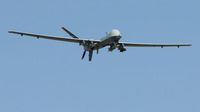In a shocking revelation, high-ranking officials from the Trump administration were found to have discussed plans to bomb Houthi positions in Yemen using the Signal messaging app. This incident, which has garnered significant attention, unfolded in a group chat that included Jeffrey Goldberg, a reporter from The Atlantic, who was inadvertently added by national security advisor Mike Waltz. The conversations, published by The Atlantic this week, detail specific attack plans, including the timing of the strikes and the aircraft involved, raising serious questions about the handling of classified information.
The group chat, described as a casual exchange, included some of the most powerful figures in the U.S. government at the time, such as Vice President J. D. Vance, Secretary of Defense Pete Hegseth, Secretary of State Marco Rubio, and Steve Witkoff, Trump’s envoy for peace talks in Ukraine and the Middle East. The chat was labeled "Houthi PC small group" and revealed discussions about imminent military actions against Houthi fighters, who had been threatening international navigation in the Red Sea.
According to a Department of Defense official speaking to CNN, the information shared in the chat was indeed classified at the time. "These are highly classified operational plans meant to protect military personnel," the source stated, emphasizing that sharing such details outside secure channels is considered reckless and dangerous.
On March 15, 2025, the U.S. launched airstrikes against Houthi positions, resulting in at least 53 deaths and over 100 injuries. The messages from the group chat indicated that Secretary of Defense Hegseth had confirmed the mission, stating that the weather was "favorable" and outlining the specifics of the operation. He detailed that two waves of F-18 fighter-bombers would be deployed, supported by MQ-9 attack drones, with Tomahawk missiles being launched from U.S. warships at sea.
In the aftermath of the revelations, Pentagon spokesman Sean Parnell acknowledged that Hegseth had shared sensitive information about the military operations while they were ongoing. This admission contradicts earlier statements from officials who insisted that no classified information had been disseminated.
Mike Waltz, who initiated the chat, accepted "full responsibility" for the situation, raising eyebrows about how a journalist known to be critical of the administration ended up in the conversation. "I take full responsibility. I created the group. My job is to ensure everything is coordinated," Waltz told Fox News. However, he did not explain why Goldberg’s contact information was saved in his phone.
The discussions within the chat not only provided operational details but also revealed the administration's sentiments towards Europe. During the exchanges, Vance expressed his frustration, stating, "I simply hate rescuing Europe again," a sentiment echoed by Hegseth, who described the situation as "pathetic." This disdain for European allies raises questions about the U.S.'s diplomatic stance and its implications for international relations.
In a subsequent analysis, experts highlighted the sensitivity of the information shared. Glenn Gerstell, a former general counsel for the NSA, stated, "The idea that this was not classified at the time is inconceivable." He noted that any imminent military action involving U.S. forces would automatically be classified due to the potential risks involved.
Messages from the chat also indicated that the U.S. military had positively identified a specific target, referred to as the "missile man" of the Houthis, who was located at a site linked to his girlfriend. This level of detail about target identification and operational planning is typically reserved for secure military communications.
Furthermore, CIA Director John Ratcliffe mentioned in the chat that the agency was "mobilizing assets" to assist with the attack, although he asserted that any delays would not negatively impact the CIA's operations in Yemen. This statement underscores the intricate coordination between military and intelligence operations during such sensitive missions.
As the situation unfolds, the implications of this group chat extend beyond mere operational security concerns. The incident has sparked a political firestorm in Washington, with many calling for accountability regarding the handling of classified information. Critics argue that the casual nature of the discussions reflects a troubling disregard for the protocols that govern national security.
In light of the revelations, the Trump administration has attempted to downplay the significance of the chat, with Hegseth asserting on social media that The Atlantic mischaracterized the exchanges. He claimed that the messages did not contain specific names, targets, or locations, attempting to mitigate the fallout from the disclosure.
However, the evidence presented in the published messages suggests otherwise. The detailed planning and execution of military operations, especially those involving airstrikes, are inherently sensitive and require strict adherence to security protocols to protect the lives of military personnel and the integrity of operations.
The fallout from this incident is likely to reverberate through the political landscape, as lawmakers and officials grapple with the ramifications of such a breach. The need for a thorough investigation into the handling of classified information and the protocols governing communication among high-ranking officials has never been more pressing.
As the dust settles, the broader implications for U.S. foreign policy and military strategy in the Middle East remain to be seen. The incident serves as a stark reminder of the delicate balance between transparency and security in matters of national defense.




